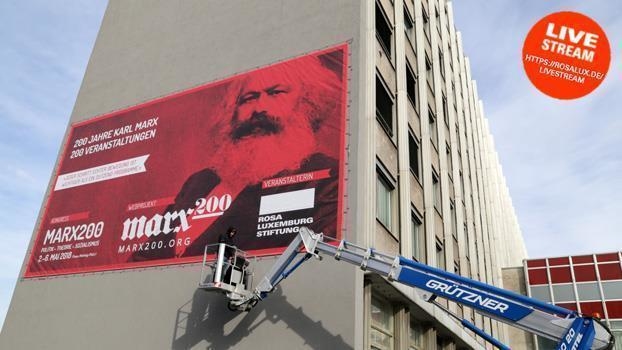
Zum 200. Geburtstag von Karl Marx wird die Rosa-Luxemburg-Stiftung einen Kongress veranstalten: eine kurze Woche mit Theorie, Politik und Kunst. Es handelt sich um die zentrale Konferenz innerhalb des ganzjährigen Veranstaltungsprogramms im Marx-Jubiläumsjahr.
Es gibt kleinere Änderungen im Programm gegenüber dem gedruckten Programm. Diese finden sich im PDF oben.
Ausgewählte Abendveranstaltungen (im Programm gekennzeichnet) werden im Livestream ausgestrahlt bzw. aufgezeichnet.
Alle Videoaufzeichnungen finden Sie innerhalb kurzer Zeit in unserer Mediathek zu marx200.
ENGLISH FOLLOWS BELOW
Viele werden Karl Marx feiern wollen, als großen Denker, einer der größten vielleicht, aber als einen, der uns heute nicht mehr viel zu sagen hat.
Wir sehen das anders.
Einige werden immer noch seine brillante Krisentheorie rühmen, aber seine politische Perspektiven entnennen wollen. Andere werden die von ihm und Engels inspirierte «wirkliche Bewegung», den Kommunismus, für den Realsozialismus, zahlreiche Gräueltaten, den Gulag verantwortlich machen wollen und damit jede Sehnsucht nach einer anderen, nicht-kapitalistischen Zukunft als idealistisch und gefährlich brandmarken.
Wir nicht.
Natürlich bedarf es kritischer Selbstreflektion marxistisch inspirierter Politik - aber eben auch ihrer kritischen Rückgewinnung für eine radikale Perspektive der Emanzipation und Befreiung, für das Einfache, das so schwer zu machen ist, eine Zukunft, eine Hoffnung, die uns Antrieb sein kann, im hier und jetzt, um «…alle Verhältnisse umzuwerfen, in denen der Mensch ein erniedrigtes, ein geknechtetes, ein verlassenes, ein verächtliches Wesen ist».
Der Kongress startet mit der Frage, was es heute bedeutet, Marxist*in zu sein - oder zu werden? – In den verschiedenen Feldern der materialistischen Theorie, der Gesellschaftsanalyse und des politischen Aktivismus. Im Anschluss werden das Verhältnis von Theorie und verändernder Praxis, die Frage nach den Subjekten der Transformation/Revolution, die Kunst der Politik revolutionärer Realpolitik (Luxemburg), einer neuen Klassenpolitik und die Fluchtlinien sozialistischer Perspektive und Utopie im Vordergrund stehen.
Mit: Tithi Bhattacharya (Indien), Luciana Castellina (Italien), Frank Deppe (Deutschland), Alex Demirovic (Deutschland), Frigga Haug (Deutschland), Ursula Huws (Großbritannien), Rhian E. Jones (Großbritannien), Katja Kipping (Deutschland), Hermann Klenner (Deutschland), Arlie Russel Hochschild (USA), Zhang Shuangli (China), Michael Hardt (USA), Wolfgang Fritz Haug (Deutschland), Michael Heinrich (Deutschland), Marcel van der Linden (Niederlande), Volker Lösch (Deutschland), Bernd Riexinger (Deutschland), Karl-Heinz Roth (Deutschland), Gayatri Spivak (Indien/USA), Hans-Jürgen Urban (Deutschland) und vielen anderen mehr...
Am 5. Mai, dem Geburtstag von Marx, wird es einen besonderen Event mit dem Theater HAU Hebbel am Ufer (HAU1) in Berlin zum Thema «gefährliche Klassen» geben.
Kontakt: marx200conference@rosalux.org
Für das gesamte Konferenzprogramm mit allen Workshopphasen siehe das angefügte PDF-Programm.
ENGLISH:
There are minor changes in the program compared to the printed program. These can be found in the PDF above.
Selected evening events will be live streamed.
MARX200: POLITICS – THEORY - SOCIALISM
To celebrate the 200th birthday of Karl Marx, the Rosa-Luxemburg-Stiftung will be hosting a large congress: a short week filled with the theories, the politics and the arts that are connected to Marx’s anniversary.
Berlin, Franz-Mehring-Platz 1, May, 2-6, 2018.
Many will want to celebrate Karl Marx as a great thinker. Some might even concede that he is one of the greatest thinkers of all time – but also as one who bears little relevance today.
We beg to differ.
And while some will praise his brilliant theory of crisis, they will denounce or not even mention his political perspectives. Others will say that communism, i.e. the “real movement” that Karl Marx and his fellow thinker and activist Friedrich Engels inspired, was responsible for real socialism, numerous of crimes and the Gulag. And by doing so, they will try to denounce the desire and dreams of another, non-capitalist future as idealist and dangerous.
Not us.
Of course, critical self-reflection of Marxism-inspired politics is necessary – but also and at the same time the critical re-appropriation of a radical perspective of emancipation and liberation. For the simple thing that is so hard to achieve – as the German playwright and poet Bertolt Brecht called it. For a future, for a perspective of hope which can help us move forward so that, in the here and now, we can “overthrow all relations in which man is a debased, enslaved, forsaken, despicable being.” The congress will start with the question what it means to be a Marxist today. In the various fields of materialist theory, the analysis of society, and political activism. Then the relationship between theory and the practice of change, the question of the subjects of transformation/revolution, the art of politics including a “revolutionary realpolitik” (Rosa Luxemburg), a new politics of class, and the horizons of socialist perspectives and utopias will be placed at the center of this conference.
With an evening on “dangerous classes” event at and with the HAU-Theater (Hebbel am Ufer), the most outstanding independent theater in Berlin, May, 4, with partying into Marx’ birthday with political debate, concert, and DJs.
With: Tithi Bhattacharya (India), Luciana Castellina (Italy), Frank Deppe (Germany), Alex Demirovic (Germany), Frigga Haug (Germany), Ursula Huws (Great Britain), Rhian E. Jones (Great Britain), Katja Kipping (Germany), Hermann Klenner (Germany), Arlie Russel Hochschild (USA), Zhang Shuangli (China), Michael Hardt (USA), Wolfgang Fritz Haug (Germany), Michael Heinrich (Germany), Marcel van der Linden (Netherlands), Volker Lösch (Germany), Bernd Riexinger (Germany), Karl-Heinz Roth (Germany), Gayatri Spivak (India/USA),Hans-Jürgen Urban (Germany), and many others.
Contact:marx200conference@rosalux.org
For the complete conference programme including all workshop phases see the attached PDF document
Standort
Kontakt
Dr. Thomas Sablowski
Referent Politische Ökonomie der Globalisierung, Rosa-Luxemburg-Stiftung
E-Mail: thomas.sablowski@rosalux.org
Telefon: +49 30 44310129